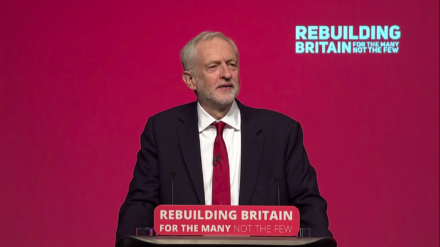
When we think of populism in recent years, we tend to think of the Ukips of the right and the Syrizas of the left. These political forces are united by their binary politics, in which they look out and see a ‘pure’ people downtrodden or ignored by a ‘corrupt’ political elite. Jeremy Corbyn’s Labour has never squarely fitted this populist mould. Instead of looking beyond the party, Corbynism’s populism looks inwards within the party itself, with potentially damaging implications for the link between the party’s MPs and their constituents.
The populism of Corbyn and his allies comes not through the way they view the wider world, but of how they conceive of the internal life of Labour. In this vein, the ‘Corbynista’ populist binary has been shaped around the relationship between the party grassroots and the parliamentary party, rather than Labour and the British political landscape at large.
As discussed in our recent research article (subscription required), this has been most obvious during times of crisis, when Corbynism appears to teeter on the brink. Since Corbyn’s election to the leadership in 2015, it has hardly been plain sailing. Internal conflict has been public and frequent, placing significant strain on relations inside the party. In the face of calls to resign, votes of no confidence and a leadership challenge, Corbyn and his closest supporters were keen to stress that party members were being ignored and usurped by the ‘collusive’ elites of the parliamentary party. At some points, this thinking drew on conspiracy theories about Blairite think tanks; the propensity to draw on conspiracy theories is another common feature of populist politics. Together, these elements form a classic populist binary, albeit within the confines of Labour’s own internal politics.
Like many populists, the remedy Corbyn and his supporters proposed to this malady was ‘democracy’. ‘Democratising’ the party, giving Labour members greater power over platform and policy, and a firmer grip of the reins of Labour MPs through reselection, would be key to remedying the apparent injustice they saw in the subjugation of the party faithful. This is the logical resolution to the populist frame: reconnecting the downtrodden with the levers of power.
However, within a party, and in a system that depends upon parliamentary representation, this has potentially harmful consequences for the link between MPs and constituents. Labour’s recent democracy review did not represent the all-out member empowerment that some might have hoped for, and have been led to expect. However, the transformation of the party in this populist image, at any stage, and the fostering of expectations about the need for it, present problems for parliamentary politics. Ultimately, the democracy of Labour is nested within the wider political system. Greater power for party members, at the expense of parliamentary representatives, risks creating a group of dues-payers with greater influence over the PLP than the constituents that MPs exist to represent.
Whether this populist dynamic will be a permanent feature of Labour’s internal politics is difficult to determine. There is little reason to think that the populism of Corbyn and his allies has waned in recent months, and the centrality of populism to the ideology of Corbynism was no doubt reinforced by its effectiveness in beating off parliamentary rebellions.
However, the Labour leadership’s Brexit stance might risk the appeal of this populist reasoning to party members going forward. As Corbyn doubles down on his commitment to a ‘jobs first Brexit’, the distance between the party’s direction on the UK’s relationship with Europe and what members want is widening. At the same time, the gap between the membership and the parliamentary party has narrowed, as the vast majority of both groups have vocalised their opposition to Brexit and Theresa May’s deal.
With these developments, the potential for internal conflict is rising. Should tensions flare up over the question of the UK’s relationship with Europe, the ability of Corbyn and his allies to use their populism to their advantage may well be severely dampened if they are not perceived to be on the side of party members on the biggest political issue of the day.
Tim Bale is professor of politics at Queen Mary University of London and Dr Jake Watts is a visiting fellow in the department of politics at the University of Sussex.




More from LabourList
Letters to the Editor – week ending 15th February 2026
‘Labour council candidates – it’s tough, but all is not lost’
‘Labour won’t stop the far right by changing leaders — only by proving what the left can deliver’